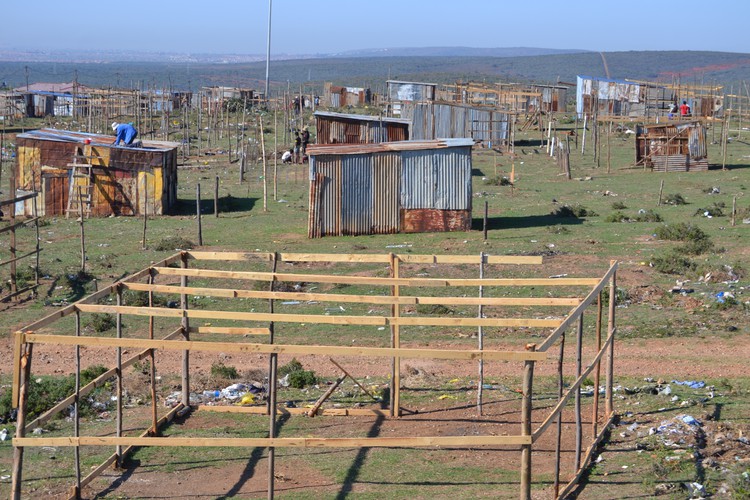Government needs to innovate if it hopes to address the housing crisis
NGOs could play a vital role as intermediaries
Archive photo of an informal settlement in Uitenhage: Thamsanqa Mbovane
As informal settlements continue to proliferate and grow despite government’s housing programmes, this article suggests several practical things the state could do to alleviate the housing crisis.
The government is clearly unable to meet the country’s housing demand, and although it has provided millions of homes since 1994, these have mostly been built in places that have exacerbated rather than addressed the legacy of spatial apartheid.
As a result, land invasions will continue and informal settlements will keep on expanding and densifying, and the state will continue to struggle to provide basic services in these unsuitable, unplanned settlements.
Furthermore, the government’s long-touted shift to provide serviced sites instead of houses will do little to alleviate the housing crisis unless finance and building support is provided.
The state will therefore continue to spend billions on the installation, maintenance, and management of infrastructure on the urban periphery, which may provide some services and improvements but will fail to tackle the core issue – building spatially inclusive cities that work for the poorest citizens.
To change this, the government needs to let go of its entrenched, existing methodology for housing delivery on the urban periphery, in particular the over reliance on external service providers. These contractors have far too much sway over small, “hollowed out” municipalities and they need to be scrutinised by national government.
Community participation in the design and implementation of housing and upgrading projects would add a level of accountability and ownership that would provide a far better chance of success. Non-government organisations (NGOs) can play a critical role as intermediaries – helping establish participation structures, troubleshooting problems, navigating community dynamics, holding officials to account, improving communication, and managing and monitoring services post installation.
NGOs working closely with communities can also play a vital role in “reblocking” an informal settlement, a process that relocates structures to create space for formal roads and services and allows for an in-situ upgrade as opposed to a relocation. The state should provide policy frameworks and funding for this.
A persistent problem has been the lack of co-ordination between departments. This creates project delays, competing interests, miscommunication and increased costs. A cross-departmental unit within municipalities focused specifically on informal settlement upgrading is long overdue.
Planning needs to include not only economic development and service departments (water, sanitation, roads, electricity etc) but also community representatives, and in smaller municipalities it should be driven by provincial and national government.
Serviced sites must be linked to finance and building support – including accessing materials, plans, finance, advice and contractors. Otherwise, it will merely increase the number of informal structures on the urban periphery.
Many municipalities will resist an approach that disrupts entrenched networks between officials and external service providers. Not only construction of housing and installation of services, but site planning, settlement mapping, waste collection and GIS support are currently all outsourced. This means that external service providers, whose motives are predominantly for profit, drive many of the decisions influencing informal settlement upgrading and management.
The state needs to start programmes that build capacity by insourcing the skills required for informal settlement upgrading, and remove the profit motive from a developmental agenda meant to improve the lives of poor people.
Rethinking the Expanded Public Works Programme (EPWP) would be a perfect starting point. A skills path could be developed for EPWP workers to fulfil crucial roles in informal settlement upgrading, with the best candidates eventually finding employment within the municipality. There are many examples of innovative EPWP workers, trained and supported by NGOs, who have skills invaluable to informal settlement upgrading programmes.
Space must also be created for officials that encourage them to try new ideas, even if some of these fail. National and provincial governments need to support, rather than suppress, innovation. Otherwise, nothing will fundamentally change.
State funding is sufficient to make a far bigger impact if money was spent in smarter and more innovative ways. NGOs can play a critical intermediary role in driving a more sustainable and people-centred approach to upgrading. But political will and a commitment to action are needed.
Views expressed are not necessarily those of GroundUp.
Support independent journalism
Donate using Payfast

Don't miss out on the latest news
We respect your privacy, and promise we won't spam you.
Next: Lottery looter is living the jet set life
Previous: In photos: Namaqualand flowers bloom after rainy winter
© 2023 GroundUp. This article is licensed under a Creative Commons Attribution-NoDerivatives 4.0 International License.
You may republish this article, so long as you credit the authors and GroundUp, and do not change the text. Please include a link back to the original article.
We put an invisible pixel in the article so that we can count traffic to republishers. All analytics tools are solely on our servers. We do not give our logs to any third party. Logs are deleted after two weeks. We do not use any IP address identifying information except to count regional traffic. We are solely interested in counting hits, not tracking users. If you republish, please do not delete the invisible pixel.

